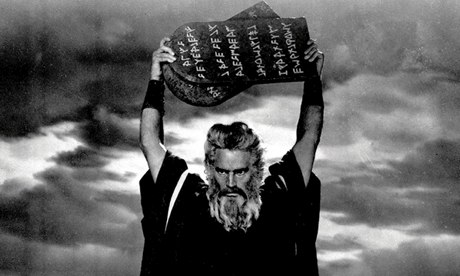Top nine things you need to know about 'listicles'

The very foundation of Judaeo-Christian ethics is presented as a list. Photograph: AP
1 On the internet, more and more articles are written as lists. They are known as listicles. You've seen the kind of thing. Thirteen Surprising Bathroom Habits Of Tech Innovators. Twenty-three Ways You Should Definitely Not Attempt To Dance. Eleven Tips For A Hot Funeral Selfie. There are even whole websites, such as Listverse, containing nothing but listicles. Is the very fabric of written culture coming apart? Is global prose dissolving into a choppy sea of bite-sized jokey paragraphs? Is it because the listicle taps into some deep pleasure centre of the mind? Are lists a form of literary crack?
2 Internet content-farmers and media corporations hungry for cheap clickbait didn't invent the list as literary form. There have long been books presented as lists ("listooks"? No, me neither), such as The Seven Habits of Highly Effective People or (in a way) Seven Types of Ambiguity. Poems, too, have sometimes taken list form ("listoems"?). Might Wallace Stevens's beautifully glancing "Thirteen Ways of Looking at a Blackbird" be the surprisingly high-culture ur-text of all modern listicle headlines? Also, the very foundation of Judaeo-Christian ethics is presented as a list: the Ten Commandments. Though Moses's famously severe listicle wouldn't fly so well online today: the trend is to use an intriguingly random-looking number rather than a neat 10.
More
2 Internet content-farmers and media corporations hungry for cheap clickbait didn't invent the list as literary form. There have long been books presented as lists ("listooks"? No, me neither), such as The Seven Habits of Highly Effective People or (in a way) Seven Types of Ambiguity. Poems, too, have sometimes taken list form ("listoems"?). Might Wallace Stevens's beautifully glancing "Thirteen Ways of Looking at a Blackbird" be the surprisingly high-culture ur-text of all modern listicle headlines? Also, the very foundation of Judaeo-Christian ethics is presented as a list: the Ten Commandments. Though Moses's famously severe listicle wouldn't fly so well online today: the trend is to use an intriguingly random-looking number rather than a neat 10.
More

No comments:
Post a Comment